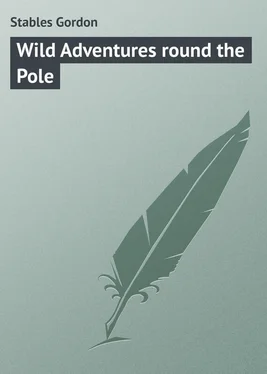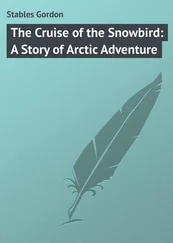Gordon Stables - Wild Adventures round the Pole
Здесь есть возможность читать онлайн «Gordon Stables - Wild Adventures round the Pole» — ознакомительный отрывок электронной книги совершенно бесплатно, а после прочтения отрывка купить полную версию. В некоторых случаях можно слушать аудио, скачать через торрент в формате fb2 и присутствует краткое содержание. Жанр: foreign_prose, foreign_children, на английском языке. Описание произведения, (предисловие) а так же отзывы посетителей доступны на портале библиотеки ЛибКат.
- Название:Wild Adventures round the Pole
- Автор:
- Жанр:
- Год:неизвестен
- ISBN:нет данных
- Рейтинг книги:3 / 5. Голосов: 1
-
Избранное:Добавить в избранное
- Отзывы:
-
Ваша оценка:
- 60
- 1
- 2
- 3
- 4
- 5
Wild Adventures round the Pole: краткое содержание, описание и аннотация
Предлагаем к чтению аннотацию, описание, краткое содержание или предисловие (зависит от того, что написал сам автор книги «Wild Adventures round the Pole»). Если вы не нашли необходимую информацию о книге — напишите в комментариях, мы постараемся отыскать её.
Wild Adventures round the Pole — читать онлайн ознакомительный отрывок
Ниже представлен текст книги, разбитый по страницам. Система сохранения места последней прочитанной страницы, позволяет с удобством читать онлайн бесплатно книгу «Wild Adventures round the Pole», без необходимости каждый раз заново искать на чём Вы остановились. Поставьте закладку, и сможете в любой момент перейти на страницу, на которой закончили чтение.
Интервал:
Закладка:
“They are all coming this way,” said McBain; “fire only at those that threaten us, and fire while they are still some distance ahead.”
Meanwhile Ralph had come on deck, and joined his companions. I do not think that through all the long terrible hour that followed, either of them spoke one word; although there was no sea on, and for the most part no motion, they clutched with one hand rigging or shroud, and gazed terror-struck at the awful scene ahead and around them.
They were soon in the very centre of what appeared an interminable forest of waterspouts. Few indeed have ever seen such a sight or encountered so pressing a danger and lived to tell it.
The balloon-shaped heads of these waterspouts looked dark as midnight; their shafts, I can call them nothing else, were immense pillars rising out of gigantic feet of seething foam. So close did they pass to some of these that the yardarms seemed almost to touch them. Our heroes noticed then, and they marvelled at it afterwards, the strange monotonous roaring sound they emitted, – a sound that drowned even the noise of the troubled waters around their shafts.
(Such a phenomenon as this has rarely been witnessed in the Northern Ocean. It is somewhat strange that on the self-same year this happened, an earthquake was felt in Ireland, and shocks even near Perth, in Scotland.)
Old Magnus made good use of his guns on those that threatened the good ship with destruction; one shot broke always one, and sometimes more, probably with the vibration; but the thundering sound of the falling waters, and the turmoil of the sea that followed, what pen can describe?
But, good shot as he is, Magnus is not infallible, else McBain would not now have to grasp his speaking-trumpet and shout, —
“Stand by, men, stand by.”
A waterspout had wholly, or partially at least, broken on board of them. It was as though the splendid ship had suddenly been blown to atoms by a terrible explosion, and every timber of her engulfed in the ocean!
For long moments thus, then her crew, half drowned, half dead, could once more look around. The Arrandoon was afloat, but her decks were swept. Hundreds of tons of water still filled her decks, and poured out into the sea in cataracts through her broken bulwarks; ay, and it poured below too, at the fore and main hatchways, which had been smashed open with the violence and force of the deluge. The main-yard had come down, and one whaler was smashed into matchwood. I wish I could say this was all, but two poor fellows lost for ever the number of their mess. One was seen floating about dead and unwounded on the deck ere the water got clear; the other, with sadly splintered brow, was still clutching in a death-grasp a rope that had bound a tarpaulin over a grating.
But away ahead appeared a long yellowish streak of clear sky, close to the horizon. The danger had passed.
All hands were now called to clear away the wreck and make good repairs. The pumps, too, had to be set to work, and as soon as the wind came down on them from the clear of the horizon, sail was set, for the fires had been drowned out.
The wind increased to a gale, and there was nothing for it but to lay to. And so they did all that night and all next day; then the weather moderated, and the wind coming more easterly they were able to show more canvas, and to resume their course with something akin to comfort.
The bodies of the two poor fellows who had met with so sad a fate were committed to the deep – the sailor’s grave.
“Earth to earth and dust to dust.”
There was more than one moist eye while those words were uttered, for the men had both been great favourites with their messmates.
Rory was sitting that evening with his elbows resting on the saloon table, his chin on his hands, and a book in front of him that he was not looking at, when McBain came below.
“You’re quieter than usual,” said McBain, placing a kindly hand on his shoulder.
Rory smiled, forced a laugh even, as one does who wants to shake off an incubus.
“I was thinking,” he said, “of that awful black forest of waterspouts. I’ll never get it out of my head.”
“Oh! yes you will, boy Rory,” said McBain; “it was a new sensation, that’s all.”
“New sensation!” said Allan, laughing in earnest; “well, captain, I must say that is a mild way of putting it. I don’t want any more such sensations. Steward, bring some nice hot coffee.”
“Ay!” cried Ralph, “that’s the style, Allan. Some coffee, steward – and, steward, bring the cold pork and fowls, and make some toast, and bring the butter and the Chili vinegar.”
Poor Irish Rory! Like every one with a poetic temperament, he was easily cast down, and just as easily raised again. Ralph’s wondrous appetite always amused him.
“Oh, you true Saxon!” said Rory – “you hungry Englishman!” But, ten minutes afterwards, he felt himself constrained to join the party at the supper table.
You see, reader mine, a sailor’s life is like an April day – sunshine now and showers anon.
“How now, Stevenson?” said McBain, as the mate entered with a kind of a puzzled look on his face.
“Well, sir, we are, as you said, off the Faroes. The night is precious dark, but I can see the lights of a village in here, and the lights of a vessel of some size, evidently lying at anchor.”
“Then, mate,” said the captain, “as we don’t know exactly where we are, I don’t think we can do wrong to steam in and drop anchor alongside this craft. We can then board her and find out. How is the weather?”
“A bit thick, sir, and seems inclined to blow a little from the east-south-east.”
“Let it, Stevenson – let it. If the other vessel can ride it out I don’t think the Arrandoon is likely to lose her anchors. Hullo! Mitchell,” he continued, as the second mate next entered hat in hand, “what’s in the wind now, man?”
“Why, sir,” said Mitchell, “I’m all ashore like, you see; I can’t make it out. But here is a boat just been a-hailing of us, and the passenger – there is only one, a comely lass enough – has just come on board, and wants to see you at once. Seems a bit cranky. Here she be, sir;” and Mitchell retired.
A young girl. She was probably not over seventeen, fair-faced, and with wild blue eyes, and yellow hair, dripping with dew, floating over her shoulders.
“Stop the ship!” she cried, seizing McBain by the arm. “Go no farther, or her ribs will be scattered over the waves, and your bones will bleach on the cliffs of the rocks.”
“Poor thing!” muttered McBain. “Oh, you heed me not!” continued the girl, wringing her hands in despair. “It will be too late – it will be too late! I tell you here is no harbour, here is no ship. The lights you see are placed there to lure your vessel on shore. They are wreckers, I tell you; they will – ”
“By the deep three!” sung the man in the chains.
Then there was a shout from the man at the foretop.
“Breakers ahead!”
Then, “Stand by both anchors. Ready about.”
Chapter Six.
A Life on the Ocean Wave – On the Rocks – Mystery – A Home on the Rolling Deep
Has the reader ever been to sea? The first feeling that a landsman objects to at sea is that of the heaving motion of the ship; to your true sailor the cessation of that motion, or its absence under circumstances, is disagreeable in the extreme. To me there is always a certain air of romance about the old ocean, and about a ship at sea; but what can be less romantic than lying in a harbour or dull wet dock, with no more life nor motion in your craft than there is in the slopshop round the corner? To lie thus and probably have to listen to the grating voices and pointless jokes of semi-inebriated stevedores, as they load or unload, soiling, as they do, your beautiful decks with their dreadful boots, is very far from pleasant. In a case like this how one wishes to be away out on the blue water once more, and to feel life in the good ship once again – to feel, as it were, her very heart throb beneath one’s feet!
Читать дальшеИнтервал:
Закладка:
Похожие книги на «Wild Adventures round the Pole»
Представляем Вашему вниманию похожие книги на «Wild Adventures round the Pole» списком для выбора. Мы отобрали схожую по названию и смыслу литературу в надежде предоставить читателям больше вариантов отыскать новые, интересные, ещё непрочитанные произведения.
Обсуждение, отзывы о книге «Wild Adventures round the Pole» и просто собственные мнения читателей. Оставьте ваши комментарии, напишите, что Вы думаете о произведении, его смысле или главных героях. Укажите что конкретно понравилось, а что нет, и почему Вы так считаете.












